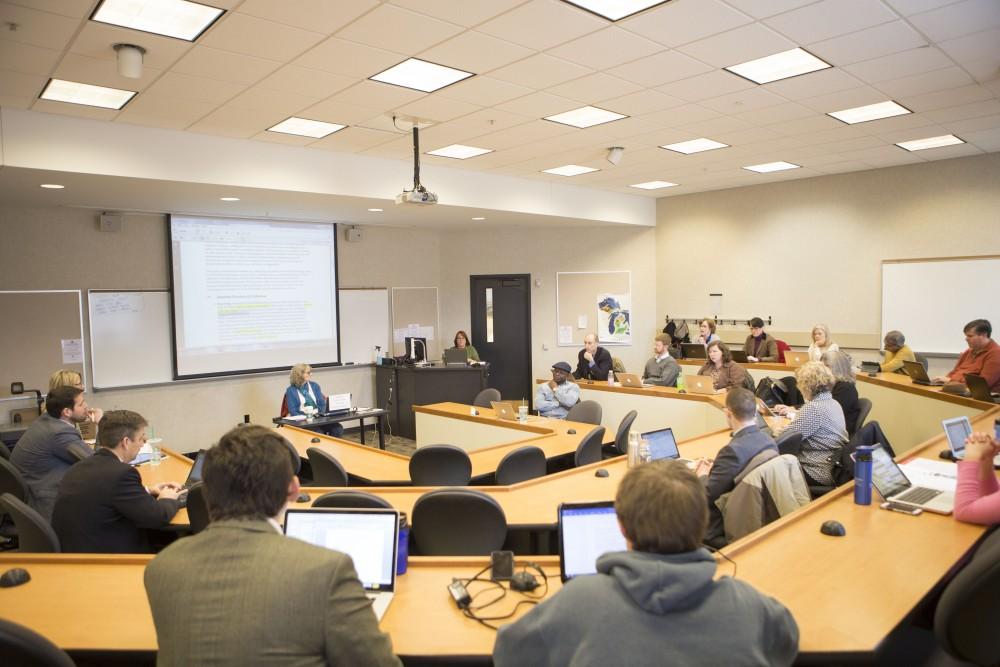University Academic Senate endorses changes to Title IX policy

GVL / Sara Carte – Grand Valley faculty meet for the UAS meeting in the DeVos Campus on Friday, Apr. 8, 2016.
Apr 11, 2016
The University Academic Senate approved a new version of Grand Valley State University’s Title IX policy requiring all university employees to report instances of sexual misconduct on April 8, though not all senate members were in full support.
Jesse Bernal, vice president of the Division of Inclusion and Equity, and Theresa Rowland, Title IX coordinator, addressed the UAS for endorsement of three key policy changes to Title IX procedures.
Changes in policy were previously endorsed by the student senate and the President’s Cabinet, and include matters relating to sexual misconduct, sexual or gender-based harassment, as well as retaliation to harassment.
The change that drew the biggest response from the UAS, however, was a policy placing responsibility on all university employees to report instances of sexual misconduct.
Danielle DeMuth, associate professor of women, gender and sexuality studies, expressed concern about the policy’s impact on student autonomy.
“I have really deep concerns about making all faculty responsible employees, because I think it takes away autonomy from students and their choice to be able to choose when to report,” DeMuth said. “I also think it damages relationships between students and faculty.”
Karen Navotny, professor of mathematics at GVSU, agreed with DeMuth that the new policy could negatively impact student-faculty relationships.
“I agree that this can destroy your relationship,” Navotny said. “I really think we need some sort of training. It seems like it’s pushing students away from you when you want them to feel comfortable with you.”
Rowland explained to senate members that employees can avoid reporting instances of sexual misconduct by directing students to other resources on campus.
Aside from the Title IX office, victims of sexual misconduct will have the opportunity to bring their concerns to “confidential employees.” Confidential employees are designated individuals not required to report such instances to the Title IX office.
Bernal said there are efforts being made to expand this list of confidential employees.
“Right now that list is pretty minimal,” Bernal said. “We’d like to expand that list so it’s more fully across the university of people that are trained to handle these situations in helpful ways.”
Bernal explained the new “responsible employee policy” comes down from the federal government, not the Title IX office. He added that the biggest challenge moving forward will be meeting the needs of both the federal government and victims of sexual misconduct simultaneously.
“We struggle with wanting to provide students with the best absolute resources and ensuring they’re coming forward to report this as well as complying with guidelines we’re receiving from the federal government,” Bernal said. “I think the procedural documents that we’re developing will offer some middle ground in that framework.”
Following Bernal and Rowland’s presentation, the UAS voted to endorse the policy with nine members in dissent.
The policy is expected to go into effect starting May 1, with final implementation taking place in fall 2016.
“We will take the concerns and input the faculty raised today very seriously, and hope they will provide good input as we continue to refine procedures for operationalizing the policy,” Bernal said.

























